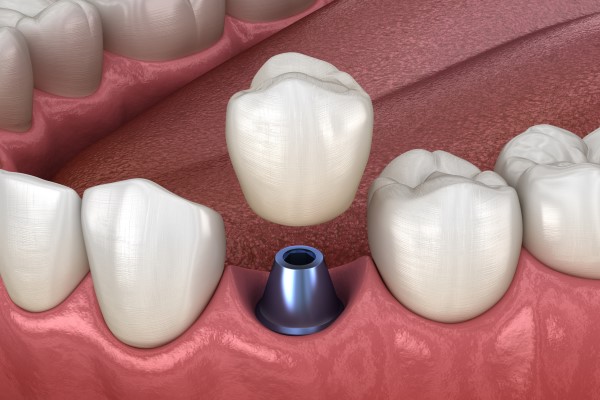A Periodontist Can Treat Dental Implant Disease

A periodontist treats oral health issues related to the supporting structures of teeth, which primarily include the gums and jawbone. One of the main conditions that a periodontist can help treat is dental implant disease. This can cause discomforting symptoms and put the health and condition of the implant restoration in jeopardy, especially if the concern is not treated in a timely manner. This review from a periodontist discusses treatment for dental implant disease in greater detail.
What is dental implant disease?
Dental implant disease, also called peri-implant disease, is a condition that causes inflammation of the gum and bone tissues that surround a dental implant. This is usually caused by repeated bacterial attacks, which may be the result of poor oral hygiene, smoking, diabetes, and hereditary factors. There are two main types of dental implant disease: peri-implant mucositis and peri-implantitis. Peri-implant mucositis causes inflammation without a significant amount of bone loss in the jaw, so it is generally considered to be less severe. However, it may progress into peri-implantitis, which causes both inflammation and bone loss if the condition is left untreated.
What are the treatment options for dental implant disease?
There are various treatment options for dental implant diseases, and a personalized treatment plan typically involves more than one form. Most periodontists try non-surgical treatments before surgical (or more invasive) procedures. The most common treatments for dental implant disease include prescription mouthwash, oral antibiotics, and bone regeneration.
Prescription mouthwash
The periodontist may provide a special prescription mouthwash for minor cases of peri-implant mucositis. This treatment aims to reduce the overall number of bacteria in the mouth, especially around the implant area(s). There are prescription antibiotic gels that can also be used to help reduce the total number of bacteria deposits.
Antibiotics (oral medication)
Antibiotics may be prescribed to kill the bacterial infections that are contributing to dental implant disease. These will attempt to prevent the need for more-invasive procedures. However, if symptoms do not improve, a surgical procedure may be the best treatment option.
Bone regeneration
Bone regeneration is a periodontal procedure designed to help stimulate bone growth in the jaw after bone loss occurs, usually as a result of periodontal disease. It is generally recommended by periodontists when there has been a significant amount of bone loss due to dental implant disease and there is no longer enough healthy bone tissue to adequately support the dental implant restoration(s).
Laser therapy
Laser therapy uses special dental lasers to target, kill, and remove bacteria that are contributing to dental implant disease. It only targets diseased gum and bone tissue to help improve the overall health of the gums, and it does not affect healthy gum tissues. This procedure also encourages the regeneration of gum and bone tissue and helps with the reattachment of the gums to the restoration(s), reducing the risk of early implant failure related to dental implant disease.
Pocket reduction surgery
Pocket reduction surgery is a periodontal surgical procedure that aims to reduce the depth of the pockets between teeth. By reducing the depth of the pockets, there is a reduced risk of bacteria accumulation that can contribute to the onset of dental implant disease. This procedure is used after the depth of the gum pockets has already been affected by conditions such as dental implant disease. Pocket reduction surgery is often used along with other treatments, such as antibiotics.
What results can I expect from periodontal treatment for dental implant disease?
There are additional treatment options that a periodontist may recommend. Patients must keep in mind that every treatment plan is personalized to meet their specific needs, so while the aforementioned treatments are common, they may not be suitable in every situation. The success rate of treatment for dental implant disease is high, though, and most patients will see their periodontal health improve, so they can avoid the loss of their dental implant restorations.
Contact our periodontist’s office today to schedule a visit
Are you experiencing any concerns with your dental implants and/or the gums and jawbone that surround them? If so, please feel free to contact our periodontist’s office in order to schedule a visit. We can help diagnose the cause of your symptoms and recommend the proper treatment solution. Our team takes genuine pride in helping patients with dental implant disease (and similar periodontal conditions) improve their oral health and save their natural teeth and restorations.
Request an appointment here: https://www.texasipc.com or call Texas Implant & Dental Specialists at (972) 535-6555 for an appointment in our Plano office.
Check out what others are saying about our dental services on Yelp: Periodontics in Plano, TX.
Related Posts
Periodontics is a specialized field of dentistry that focuses on the prevention, diagnosis, and treatment of periodontal disease and other conditions affecting the gums, as well as the placement and maintenance of dental implants. It is essential for maintaining the gums' health and the teeth' supporting structures. If your dentist has recommended the care of…
Periodontal procedures are generally used to address oral health concerns such as periodontitis. However, many are surprised to learn about the cosmetic advantages surgical procedures from a periodontist can provide. This review discusses several procedures periodontists perform that have cosmetic uses and help to improve the health of the gums and jawbone.Notable periodontal cosmetic surgical…
There are various periodontal cosmetic procedures to choose from if you have missing teeth. Most people will lose at least one of their teeth at some point in their lives.Gum disease is the top cause of adults losing their teeth. It is a bacterial infection that leads to the inflammation of gum tissues. A periodontist…
Gum disease is a common condition among adults. Also known as periodontal disease, it occurs when bacterial attacks damage the gum and bone tissue that support teeth. Gum disease, along with its effects, often need to be treated before the placement of dental implants during the teeth replacement process.Much like natural teeth, dental implants are…
